Download Your Loyola Health Care Plan for Students
Transcript
Your Loyola Health Care Plan for Students User’s Manual An easy-to-use guide to get the care you need when you need it 2007-2008 G rowing up is never easy – especially when it comes to dealing with things like health insurance. But now that you’re on your own health care plan, it’s important to know how to use it. This User’s Manual is designed to guide you through the sometimes confusing world of health care, with helpful tips and information about things like how to find a doctor, what to do when you are sick and how to file a claim. Keep it handy as a reference guide, just in case you ever have questions and want to know where to turn. With this guide, you can take charge of your health and get the care you need. Some Important Terms to Know Who Is Required to Have Coverage Premium – The fee that’s added to your student account at the beginning of the fall or spring semster, allowing you to have coverage L oyola University Chicago’s Board of Trustees requires that the following students have individual health care insurance: •A ll undergraduate students enrolled for 12 or more credit hours at the start of the fall or spring semester Deductible – How much you are required to pay out of your pocket in a given year before the plan pays benefits •A ll graduate students enrolled for 8 or more credit hours (or registered for thesis or dissertation supervision) at the start of the fall or spring semester Coinsurance – The percentage cost of a certain service that is paid by the plan; you pay the rest •A ll students at the Stritch School of Medicine Out-of-Pocket Maximum – The most you have to spend out-of-pocket in a year For many of you, that means being covered under your parents’ plan; or you may already have an individual policy in place. If this is the case, then you must complete a waiver to opt out of the plan if you want to avoid unwanted charges on your tuition bill. You Pay If you meet the enrollment criteria above and do not have coverage, you will be enrolled in Loyola’s Health Care Plan for Students and your student account will be billed accordingly. If you are a student and do not fall into one of these categories, you may voluntarily purchase coverage under the plan. Go to the Student Health Insurance link at www.luc.edu/bursar/. The Plan Pays How the Plan Works Up to the $500,000 lifetime limit Health Insurance Basics T o understand how Loyola’s Health Care Plan for Students works, you first need to be familiar with the basics. Health insurance is based on the concept of shared risk. That means you pay a certain amount up front to have coverage, also known as your premium. First, you pay your deductible • $150 in-network • $ 400 out-of-network Then, each time you need care — whether it’s for an accident, illness or injury — the plan pays the cost of the service after you pay the deductible and coinsurance. As a covered individual, you are also protected by the out-of-pocket maximum. So, in the event of an accident or other major unforeseen procedure, you won’t be burdened with excessive medical bills. Then, the plan pays a percentage • 80% in-network • 60% out-of-network And you pay the remaining amount • 20% in-network • 40% out-of-network Once the amount you pay reaches the plan maximum • $3,000 in-network • $6,000 out-ofnetwork The plan pays 100% of all remaining covered expenses An Overview of Your Benefits Under the Plan To summarize: After you pay the annual deductible of The plan pays the following coinsurance In-network Out-of-network $150 per person $400 per person H ere’s a snapshot of your benefits under the Loyola Health Care Plan for Students: 80% after deductible 60% after deductible Up to the annual out-of-pocket $3,000 per person plan year maximum Benefit $6,000 per person In-network Out-of-network After you meet the deductible, the plan pays: Understanding the Network The Loyola Health Care Plan for Students is a Preferred Provider Organization (PPO) plan provided through UniCare — one of the leading health care insurance companies in Chicago. To help bring you the best coverage at the most affordable cost, UniCare negotiates with doctors and hospitals who agree to become “preferred providers” in the UniCare network and to charge lower rates. This network of health care providers is also known as the PPO. Doctor’s office visit 80% of negotiated rate 60% of reasonable expenses X-ray/lab 80% of negotiated rate 60% of reasonable expenses Emergency 80% of negotiated rate 80% of reasonable expenses Hospitalization 80% of negotiated rate 60% of reasonable expenses Maternity 80% of negotiated rate 60% of reasonable expenses Mental health 80% of negotiated rate 60% of reasonable expenses (limited to $10,000 per plan year) When you access medical care through an in-network PPO provider, you generally pay less, as shown in the chart. If you go to an out-of-network provider, not only are your benefits paid at a lower level, you are also responsible for paying the full cost of the service up front and filing a claim form for reimbursement. To determine if your current doctor participates in the UniCare network, or to find a new network doctor or hospital, visit www.unicare.com or call 800-696-9776. Plan Year The plan year runs from August 1 through July 31. For Stritch School of Medicine students, the plan year is July 1 through July 31 of the following year. Receiving Medical Care Tips for Choosing a Doctor T here are a variety of situations in which you might need to receive medical care. Depending on your circumstances, here’s how to get the care you need and maximize your benefits under the plan. The doctor you choose can have a significant impact on the quality of care you receive. Some of you may still have your long-time family doctor, but many of you probably live too far from home. If you are looking for a doctor in the area, here are some tips to find the right one for you. Services at the Wellness Center Staying healthy is especially important during your college years, and getting routine physicals on a regular basis can help prevent problems from developing later on down the line. Preventive care encompasses everything from annual check-ups and immunizations to X-rays and lab work. • Ask friends, mentors, professors and other local contacts for doctor recommendations. • Review databases, such as the American Medical Association’s Physician Select, to obtain information, including credentials, education and specialty, about virtually every licensed physician in the U.S. Although the plan does not cover doctor visits for such routine care, Loyola’s Wellness Center at the Lake Shore campus is available to you for a variety of preventive care services. Medical students are eligible for similar wellness services and resources through the Stritch School of Medicine Student Health Service. • Verify the doctor’s office hours and ask if he or she has admitting privileges at a convenient hospital. • Verify that your doctor is in the UniCare network by logging on to www.unicare.com and clicking Online Provider Directory. The Wellness Center can help keep you healthy with services including: • Allergy injections • Pregnancy tests • Gynecological exams • Referrals • Health education • STI/HIV antibody testing • Immunizations • Telephone advice • Lab tests • Throat cultures • M ental health counseling and group therapies • Tuberculosis screening A Note About Pre-existing Conditions Pre-existing conditions are injuries or sicknesses for which you incurred expenses, received medical treatment, consulted a health care professional or took prescription drugs during the six-month period immediately preceding your effective date of coverage. If you have a pre-existing condition, the health care plan will not pay benefits for the condition until you have been continuously covered for six months. The pre-existing condition limit does not apply to pregnancy or to any newborn or adopted child. Many of these services are included in the student activity fee. This fee is included on your student account based on your number of credit hours. Some lab tests, immunizations, medications and other materials are available for an additional low fee. Creditable Coverage This pre-existing condition limit will be waived if you had prior creditable health care coverage (such as another group or individual policy). You will receive credit for prior health insurance as long as you did not have a break in coverage of 63 days prior to the effective date of coverage under the Loyola Health Care Plan for Students. For more information about the Wellness Center, visit www.luc.edu/wellness. When You Are Sick or Injured What Is an Emergency? If you have a sudden onset of illness or are injured in an accident, you must first determine if your condition is an emergency, as highlighted in the What Is an Emergency? box. Using the emergency room for non-emergency medical care doesn’t make sense. Not only does it tie up important resources that may be needed for a true emergency, but it can fail to provide the best care, given your medical history and overall health status. It can also cost you money since use of the emergency room for non-emergency services is not covered under the Loyola Student Health Plan. If you need emergency care, you should immediately go to the nearest emergency facility or dial 911. It doesn’t matter if the facility is in the PPO network. As long as it’s a true emergency, you will receive the same benefit either way, in- or out-of-network. “Emergency” means serious impairment to a bodily function or serious dysfunction of any bodily organ. An emergency places the health of the individual (or, for a pregnant woman, the health of the woman or her unborn child) in serious jeopardy. If your illness or injury does not require emergency care, you have several options. While heading straight to the doctor’s office may seem like the best plan of attack, you may be able to save yourself some time and money by consulting one of the health hotlines or online resources available to you, as described in the box, Health Resources at Your Fingertips. How do you know when it’s a real emergency? Examples of symptoms that may indicate the presence of an emergency medical condition include: • Difficulty breathing If you feel that you need to see a doctor, you can either: • Severe chest pains • Visit the Wellness Center on Loyola’s Lake Shore campus or the Student Health Service (for medical students); or • Convulsions or • Persistent severe abdominal pain • Go to a doctor who participates in UniCare’s PPO network to receive maximum benefits under the plan. For a detailed explanation of plan benefits refer to the UniCare Health Care Plan for Students certificate. Please keep in mind that emergency services are subject to a deductible and coinsurance. When You Need Care for Mental Health or Substance Abuse Additionally, Loyola has a partnership with Ulifeline, an online support system geared toward young adults. At www.ulifeline.org you can access helpful tools and resources and get answers about mental health concerns you may have. If you are a student at the Stritch School of Medicine, contact the Office of Student Affairs for information about the mental health resources available to you. Your emotions and mental well-being are just as important as your physical well-being, and with the stress of school work and other commitments, it’s not uncommon for college students to feel depressed, lonely or confused. If you think your mental health might be suffering and that counseling would be beneficial, help is available to you. In conjunction with these resources, the Loyola Health Care Plan for Students provides coverage for mental health. So if you need ongoing treatment, you would pay 20% out of your pocket, after the deductible, when you visit a provider in the network. Loyola’s Wellness Center provides students with six individual, short-term counseling sessions each year. You also have the opportunity to participate in various group therapy sessions, depending on your comfort level. Following Your Doctor’s Orders Health Resources at Your Fingertips T o get the best care, it’s important to follow your doctor’s recommendations for additional treatment, but it’s up to you to make sure that any extra services you receive are covered under the plan. Here are some situations you may face and what you need to know: Thinking of running to the doctor? Before you do, check out one of these resources for information and tips about your ailment. MedCall MedCall is a toll-free patient assistance and health education line where trained registered nurses are available 24 hours a day, seven days a week, to give you free information and answer most general health questions. MedCall nurses can: If your doctor refers you to a specialist or another facility for lab work, always check with UniCare to be sure that the other provider is in the PPO network. If not, ask your doctor for an alternate recommendation to avoid paying at the out-of-network level. If your doctor recommends surgery or hospitalization, try to get as much information as possible to be sure this is the appropriate treatment for you. You may also want to consider getting a second opinion. •P rovide information on diagnosed conditions, medical tests and treatment options, prescription drugs, etc.; and •A dvise you on what may be an appropriate action for many situations. To reach MedCall, call 800-814-0041. What if I Need to See a Specialist? Dial-a-Nurse Dial-a-nurse is available to all Loyola students throughout the school year and can assist you with various health concerns and questions. Contact Dial-a-Nurse, during business hours, at 773-508-8883 or Resurrection Health Care, after hours, at 877-RES-INFO. Under the PPO plan, you never need a referral to visit a specialist. Log on to www.unicare.com and click on Online Provider Directory to find a doctor in your desired specialty. Healthcare Advisor by Subimo Healthcare Advisor is an innovative website that provides additional decision-making resources and information that you may find useful when preparing for a medical procedure or managing a medical condition. To access Healthcare Advisor, log on to www.unicare.com. Finding a Network Provider To find a network doctor or hospital, go to www.unicare.com: • In the middle of the page, toward the right, click Online Provider Directory; • If you are enrolled in the plan - Enter your member number in the Member Personalized Search column; -A nd follow the instructions for selecting the type of provider you are looking for. • If you are not yet enrolled - Go to the Visitor Search column and click Next; - Select Large Group Plans; - Choose UniCare PPO 2007; - And select your provider type. Using the Prescription Drug Program C hances are you’ll need to have a prescription filled at some point during your time at Loyola. Navigating the prescription drug marketplace can be a challenge, but with these tips, you can be sure you’re getting the right medication at the lowest possible cost. Your Prescription Benefits Under Loyola’s Health Care Plan for Students there are four categories of drugs and how much you pay depends on the drug type. The categories are: Drug Category How Much You Pay for a 30-day Supply* How Much You Pay for a 90-day Supply through the Mail Order Drug Program* Generic $15 copay $30 copay Preferred brand $30 copay $60 copay Non-preferred brand $60 copay $120 copay Self-injectables 20% coinsurance per prescription up to $200 maximum copay per prescription 20% coinsurance per prescription up to $200 maximum copay per prescription * Subject to a $3,000 annual maximum benefit per person •G eneric — drugs that are labeled with the medication’s basic chemical name and usually have brand-name equivalents. They have the same active ingredients and must meet the same FDA standards for quality, strength, purity and stability as their brand-name counterparts. How Much Do Prescription Drugs Really Cost? Although you pay a fixed fee — $15, $30 or $60 — at the pharmacy counter, the plan pays the majority of the cost of your prescription, so you may be surprised to learn how much your medications really cost. Each time you fill a prescription, the plan pays the difference between the true drug cost and your copayment. The plan has a $3,000 annual maximum benefit per person. If the amount the plan pays reaches $3,000, you will have to pay all drug costs after that point. Most likely, you won’t reach this limit, but it’s something to keep in mind if you expect to incur a lot of prescription drug expenses during the year. • Preferred brand — drugs that do not have a generic equivalent. They cost more than generics, but less than non-preferred brand-name drugs. • Non-preferred brand — drugs that generally have either an equally effective generic equivalent and/or one (or more) preferred brand-name options. These drugs do not appear on the formulary (described on page 7). • Self-injectables— drugs including insulin and other self-injectable medications. Certain limitations may apply. Depending on how much medication you need, you may fill your prescription either through a paticipating network retail pharmacy (such as Walgreens or CVS) or through UniCare’s Mail Order Drug Program. If you need a certain drug for a chronic condition, such as allergies or asthma, you can save time and money by using the Mail Order Drug Program. The following chart shows how much you pay for a prescription, based on the type of medication, and whether you use a retail pharmacy or mail order. What Is a Formulary? How to Fill a Prescription A formulary is a list of effective, affordable and commonly prescribed brand-name and generic drugs. Drugs that are classified as either “generic” or “preferred brand-name” appear on the formulary. Drugs that do not appear on the formulary are considered to be non-preferred and are covered at the lowest benefit level. With approximately 54,000 participating pharmacies nationwide and a convenient mail order program, UniCare makes it easy for you to get your prescription filled. Just follow these steps: To be sure that you’re getting the most for your money, you should always check the formulary before having a prescription filled. As an added measure, you may even want to bring a copy of the formulary to your next doctor’s office visit so you can discuss which drug will be most appropriate and cost effective for you. Retail Pharmacy (30-day supply) Step 1: F ind a participating pharmacy by calling Customer Service at 800-214-4844 or logging on to www.unicare.com and clicking Provider Finder. Most major drug store chains, including CVS and Walgreens, are in the network. Step 2: Present your UniCare ID card, along with the prescription from your doctor, at the pharmacy counter. Step 3: Pay the prescription drug copayment — either $15, $30 or $60 — depending on the type of drug. Step 4: You’re done. As long as you go to a participating pharmacy, there are no claim forms to submit. For a comprehensive list of formulary drugs, log on to www.unicare.com. Generic vs. Brand-Name Drugs Every single drug product has a generic name. Some are easily recognized, like aspirin or penicillin, but others are probably less familiar because they are sold under a different name — a brand name. Products sold under their generic names are generally less expensive than products sold under a brand name because the companies that manufacture them usually do not spend money on the marketing of generic products. Companies that sell brand-name products, on the other hand, must charge more to offset their advertising and marketing costs. Often, the higher cost of brand-name prescription drugs also helps offset the cost of the research conducted to develop that drug. While all drugs have generic names, some drugs are not yet available in a separate generic version. New drugs are protected by patents for a period of time. This means that only the company that developed the drug and obtained the patent can sell it during that period. Once the patent expires, other companies can seek FDA (Food and Drug Administration) approval to produce the drug and a generic can become available. Virtually all pharmaceutical experts agree that drugs sold under a generic name are equivalent to brand-name drugs because no matter the category, all drugs must be approved by the FDA. Mail Order Drug Program (90-day supply) Step 1: A sk your doctor for a written prescription for up to the maximum (90-day) amount of the medication, plus refills, if appropriate. Step 2: Complete the Patient Profile Questionnaire and Mail Order Drug Request Form, available online at www.unicare.com. Step 3: Include a check, money order or credit card number for the amount of the copayment. Step 4: Mail the completed forms and written prescription to PrecisionRx, P.O. Box 961025, Fort Worth, TX 76161-9863. For refills: Simply call the toll-free number on your mail order form or on the box or bottle containing the medication. The label will indicate whether refills are available. When you call, be prepared to give your ID number, prescription number and credit card information. You may also request your refill online at www.unicare.com. Tracking Your Medical Claims Your ID Card Always be sure to present your ID card whenever you go to a doctor, hospital, pharmacy or other facility to get the maximum benefits. Only you and any covered dependents may use your ID card. T he claims filing process may seem a little confusing to you, especially if this is the first time you’re on your own health care plan. To make things a little clearer, here’s an easy step-by-step look at how the claims process works, depending on if you go to an in-network or out-of-network provider. In-network Step 1: Go to your provider to receive medical care. Step 2: Present your ID card. Step 2: P ay for the entire cost of the service up front. anaging your health is easy at www.unicare.com. To get started, click on Members and then Register Now to create a User ID and password. You will need the member ID number shown on your UniCare ID card to register. Don’t forget your User ID and password — you’ll need it every time you log on to the site. Once registered, you’ll be able to perform a variety of functions quickly and easily: Step 3: P rint out a claim form from www.unicare.com and submit it, along with your receipt, to P.O. Box 4458 Chicago, IL 60680-4458. Step 4: Y ou will receive an Explanation of Benefits (EOB) from UniCare showing what was paid by UniCare, the amount of the provider contracted discount Step 4: and any balance (the deductible and/or 20% you are responsible for) that you must pay. Step 5: Y ou will receive a bill for the balance from your provider. M Out-of-network Step 1: G o to your provider to receive medical care. Step 3: Y our doctor will submit a claim to UniCare for you. Helpful Online Tools at UniCare.com • Check on the status of a claim • Search for a participating or contracted doctor • Verify deductibles, coinsurance and out-of-pocket maximums niCare will reimburse you U based on the out-of-network benefit level (60% of the cost, after the deductible, for most services). • Review your Explanation of Benefits (EOB) • Check your plan coverage • Manage your profile • Contact UniCare customer service Step 6: M ake your payment directly to the provider. To check on the status of your claim, log on to www.unicare.com and click on View Claims. If you have specific questions and need to speak with a customer service representative, call 800-696-9776. If You Choose to Remain in Loyola’s Plan Important Note for Stritch School of Medicine Students I Stritch School of Medicine students have different waiver deadlines than Loyola University Chicago students. For details, contact Student Affairs or go to www.meddean.luc.edu/. For information about the Health Care Plan for Students or to waive coverage, go to www.meddean.luc.edu/, click on Current Students, scroll down to Student Resources and click on Loyola’s Health Care Plan for Students. f you do not waive coverage and choose to remain in Loyola’s plan, the annual cost for coverage, $1,595, will automatically be added to your student account for 2007-2008. If you have a spouse or child(ren) whom you would like to cover under Loyola’s Health Care Plan for Students, your annual cost for health care insurance is listed in the chart below. The costs are the same whether you voluntarily enroll or are required to have coverage. If You Want Coverage For Annual Cost You only $1,595 Your spouse, add $3,527 One child, add $2,315 Two or more children, add $2,916 If You Leave the University To be eligible for insurance coverage under the University plan, you must be fully enrolled for the first 60 days of the academic year. If you are not enrolled for the first 60 days, or if you leave the University within the first 60 days of your enrollment as a student, your coverage under the Loyola Health Care Plan for Students will end. Continuing Coverage To purchase dependent coverage or if your situation changes during the year and you need coverage under the Loyola Health Care Plan for Students, go to the Student Health Insurance link at www.luc.edu/bursar/. Please note that insurance contributions for your dependents are paid separately, not as part of your tuition. If your insurance under Loyola’s Health Care Plan for Students ends for any reason, you may be eligible to continue your coverage. To qualify, you must have participated in the Loyola plan for the six months immediately preceding the date your coverage ended. Continuation coverage can be purchased for six months with payment due in full prior to the coverage effective date. To learn more about continuation coverage, contact UniCare before your student coverage ends on July 31, 2007. If You Choose to Opt Out of Coverage This brochure highlights some of the features of the Loyola Health Care Plan for Students. Full details of these benefits are provided in the official contract governing the plan. If there is a discrepancy between the information contained in this brochure and the legal official contract, the official contract will prevail. Many students will waive coverage in Loyola’s Health Care Plan for Students because they are covered under their parents’ insurance. If you are covered under your parents’ medical insurance plan, or have an individual policy in place, then you must complete a waiver to opt out of the plan and avoid unwanted charges on your student account. To waive coverage go to the Student Health Insurance link at www.luc.edu/bursar/. How to Get More Information If you have questions or specific requests, use the contact information in this chart to get the answers you need. If you… Contact Want to fast track your enrollment and ID card Go to the Student Health Insurance site at www.luc.edu/bursar/ Want to opt out of student health care coverage Go to www.luc.edu/bursar/ and click on Student Health Insurance. Complete the waiver and submit electronically by October 1, 2007. Want to reverse a waiver for student health care coverage Send an e-mail request to [email protected] Want to voluntarily purchase coverage If you are not required to have coverage but want to buy it for yourself or dependents, go to Student Health Insurance at www.luc.edu/bursar/ Want to find a doctor, hospital or pharmacy UniCare 800-696-9776 www.unicare.com, click on Online Provider Directory Want to speak to a nurse about a health concern MedCall 800-814-0041 24 hours a day, 7 days a week Loyola University Wellness Center Dial-a-Nurse (weekdays during school year): 773-508-8883 Resurrection Health Care (after hours): 877-RES-INFO Stritch School of Medicine Student Health Service 708-531-7900 Have a concern about mental health Loyola University Wellness Center www.luc.edu/wellness Phone: 773-508-2530 Ulifeline www.ulifeline.org Need to verify benefits, UniCare 800-696-9776 eligibility or obtain a predetermination of benefits Have a claim question UniCare 800-696-9776 www.unicare.com, click on View Claims Your Rights F ederal law dictates your rights concerning your own health information. Under the Health Insurance Portability and Accountability Act of 1996 (HIPAA Privacy Rule), you have the right to: • S ee or get a copy of certain information that UniCare has about you (contained in the Designated Record Set) or ask that they correct your personal information that you believe is missing or incorrect. If someone else (such as your doctor) gave UniCare the information, they will let you know so that you can ask them to correct it. •A sk UniCare not to use your health information for payment or health care operations activities. They are not required to agree to these requests. •A sk UniCare to communicate with you about health matters using reasonable alternative means or at a different address if communications to your home address could endanger you. •R eceive a list of disclosures of your health information that they make on or after July 1, 2005, except when: • You have authorized the disclosure; • The disclosure is made for treatment, payment or health care operations; or • The law otherwise restricts the accounting of such disclosures.












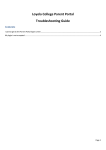
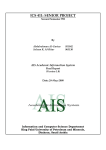
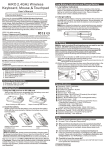
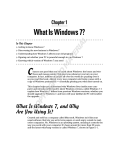

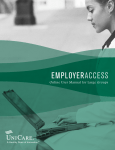




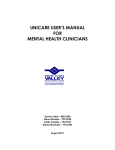

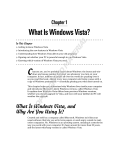


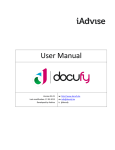
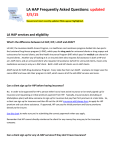
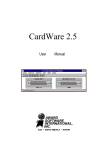
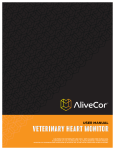
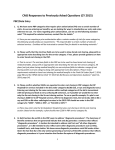
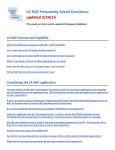
![[DvRELATIONS] - SyntaX Software Inh. Jörn Satow](http://vs1.manualzilla.com/store/data/006800015_1-13c0737460c05dc4e09174afe239eecd-150x150.png)